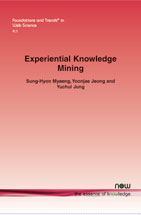Experiential Knowledge Mining
By Sung-Hyon Myaeng, Korea Advanced Institute of Science and Technology (KAIST), Korea, myaeng@kaist.ac.kr | Yoonjae Jeong, Korea Advanced Institute of Science and Technology (KAIST), Korea, hybris@kaist.ac.kr | Yuchul Jung, Korea Institute of Science and Technology Information (KISTI), Korea, enthusia77@gmail.com
Abstract
Recent advances in Internet and Web technologies and the advent of Web 2.0 have made it possible to share information and knowledge surrounding human activities, which can be obtained from massively deployed sensors and the Web resources. This survey provides a comprehensive overview of mining experiential knowledge bearing on human activities, with an emphasis on the use of the Web. Starting from definitions of activities and experiences, we elaborate on various views of human activities in cognitive science, including knowledge representation schemes. We then describe two activity detection techniques arising from different types of information sources: sensor-driven approaches for the physical space and text-driven approaches for the cyberspace. Focusing on experiential knowledge of human activities that can be discovered from unstructured text, we review and summarize the existing body of literature on experiential knowledge filtering, context identification for knowledge, and knowledge distillation. There is no doubt that the vast amount of information on human experience including activities is going to help detecting, recognizing, and understanding human activities of various sorts. We illustrate potential applications of experiential knowledge in different domains, such as information retrieval, service recommendation, and semantic Web. Following the survey of on-going research on capturing and utilizing human activities and experiences, we finally present challenging research issues for further research.
Experiential Knowledge Mining
Recent advances in Internet and Web technologies and the advent of Web 2.0 have made it possible to share information and knowledge surrounding human activities. These activities can be captured through the intensive deployment of sensors and the Web resources. Experiential Knowledge Mining provides a comprehensive overview of mining experiential knowledge bearing on human activities, with an emphasis on the use of the Web. Starting with definitions of activities and experiences, it elaborates on various views of human activities in cognitive science, including knowledge representation schemes. It then describes two activity detection techniques arising from different types of information sources: (1) sensor-driven approaches for the physical space and (2) text-driven approaches for the cyberspace.
With a focus on experiential knowledge of human activities that can be discovered from unstructured text, Experiential Knowledge Mining reviews and summarizes the existing body of literature on experiential knowledge filtering, context identification for knowledge, and knowledge distillation. There is no doubt that the vast amount of information about human experience that includes activities is going to help detecting, recognizing, and understanding human activities of various sorts. This monograph illustrates the various potential applications of experiential knowledge in different domains like information retrieval, service recommendation, and semantic web.
Experiential Knowledge Mining is the first to take a comprehensive look at this fascinating topic and acts as an ideal primer for anyone who wants to delve deeper into this subject.
